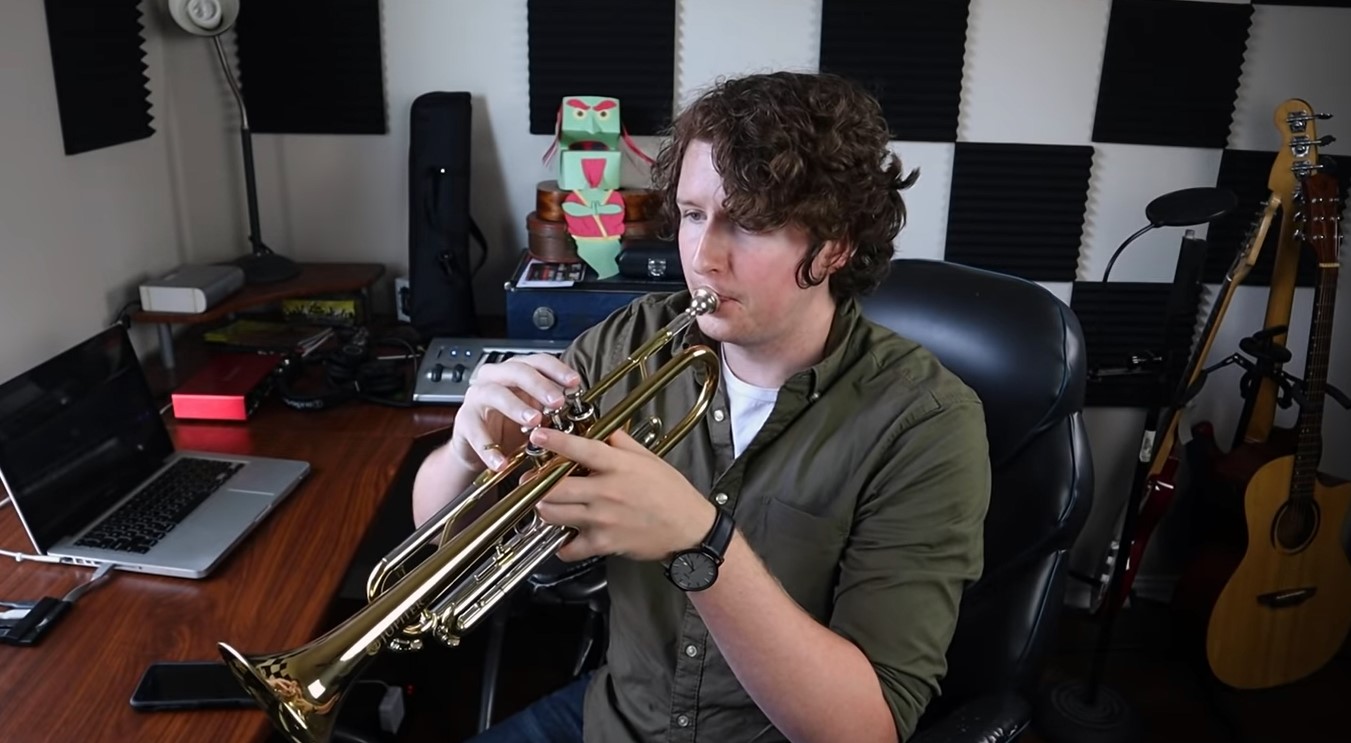The trumpet is a popular wind instrument that can be heard in many genres of music, from jazz to classical music. Learning to play trumpet takes time and effort, but it is an enjoyable experience for anyone interested in making music.
Whether you are a beginner looking to learn the basics or an experienced musician wanting to refine your skills, there are some things you need to know when it comes to learning how to play the trumpet.
The Components of Playing Trumpet
Dedication and Practice
Playing an instrument such as the trumpet can be a difficult task, but with dedication and practice, anyone can learn to play. Dedication and practice are the two most important components for learning how to play the trumpet.
With dedication and commitment to practicing regularly, even novice players of this instrument can become proficient in a short amount of time.
The first step to becoming an accomplished trumpeter is dedicating yourself to learning the basics of playing this brass instrument.
Dedication requires knowing that you need to set aside time each day to practice playing scales and etudes so that you get more familiar with your instrument and its techniques.
Additionally, dedicating yourself also means that you must have patience when it comes to learning new concepts or pieces of music.
The second component for successful trumpet playing is regular practice.
Memorization and Technique
Memorization and Technique are two essential components that all trumpet players should focus on in order to become great. Developing these skills will help players gain a deeper understanding of the instrument and allow them to progress faster in their playing.
The memorization aspect of trumpet playing is key. It helps musicians understand the music they are attempting to play, as well as how it will sound when performed.
Memorizing songs allows players to be able to perform without having to read from sheet music every time, which can be particularly helpful for gigs or other performances where it’s not always convenient or possible for a musician to have access to printed music.
Memorizing also helps with a player’s development of improvisation techniques, allowing them more freedom over their own performance style and sound.
Overcoming Challenges
Playing the trumpet is a challenging musical journey, but overcoming those challenges can be an important part of the process. The trumpet has a unique sound and requires special techniques to master.
It’s also one of the most difficult instruments to play in tune, so it takes dedication and hard work to become skilled in playing it.
The first step in overcoming challenges when playing the trumpet is developing good technique. This includes learning how to properly position the mouthpiece, lips, and teeth for producing sound.
Additionally, players must learn proper breathing techniques as well as how to move their fingers correctly on the valves for correct intonation and articulation.
Developing these skills takes time and practice but is essential for achieving success when playing this instrument.
Another key component of overcoming challenges when playing trumpet is having patience and perseverance.
Supportive Resources
Supportive Resources are one of the most important components when it comes to playing the trumpet. It is essential for trumpet players to have access to the right materials and resources in order to improve their skills and technique.
Having access to knowledgeable instructors, helpful mentors, or even online tutorials can help trumpeters achieve their goals as a musician.
The right supportive resources can make a tremendous difference in how quickly a person learns to play the trumpet. Instructional materials such as books, videos, and online classes provide valuable information that can help trumpeters learn faster while also providing guidance on proper technique and fingering.
Additionally, having someone who is experienced with playing the instrument can be beneficial in helping new players troubleshoot any issues they may be having with their playing.
Mentoring programs are an excellent way for students of all levels of experience to get personalized instruction from more advanced players.
Why Are Trumpets Hard to Learn?
Physical Challenges: Embouchure, Breathing-
Learning to play a musical instrument is no easy feat, but trumpets may be one of the most difficult instruments to master. To make matters worse, learning proper trumpet embouchure and breathing techniques can be especially challenging for novice players. But why are trumpets so hard to learn?
The two main challenges in playing the trumpet are the proper embouchure and breathing techniques. The embouchure is critical because it affects both sound production and pitch accuracy.
It requires coordinating lip muscles and tongue placement in order to get a good sound from the instrument. Similarly, correct breathing technique is essential for controlling airflow which impacts volume and tone quality.
This combination of synchronizing muscle control between lips and lungs can often feel overwhelming for beginners.
Fortunately, with practice comes progress!
Mental Challenges: Memorizing Notes, Concentrating-
Learning to play the trumpet is no simple task, and many musicians find that this brass instrument presents unique mental challenges. Memorizing notes and concentrating on playing the instrument can be difficult, especially for those unfamiliar with music theory and reading sheet music. So why is it so hard to learn how to play the trumpet?
The trumpet’s range of sound consists of some very high pitches, making it difficult to replicate without extensive practice. Players must also work on their breath control in order to create a steady stream of air while playing which will keep their notes in tune.
This requires both physical and mental stamina as players need to stay focused over extended periods of time while they practice their scales or solos. Additionally, due to its small size, the trumpet can be hard to handle for beginners who are not used to its shape or weight yet.
Practice Strategies: Repetition, Warm-Ups
Playing the trumpet is a skill that requires a great amount of dedication and hard work. While it can take years to master, having the right practice strategies can help to make learning the instrument easier. Two key components of any trumpet practice routine are repetition and warm-ups.
Repetition is essential for mastering any skill on the trumpet, as it helps players to become comfortable with different pieces of music and fingering techniques.
When first learning a piece, it’s important for players to focus on each measure or phrase at a time before attempting playing through an entire song.
It may be tempting to try and play faster than what feels comfortable in order to progress more quickly; however, this often leads to mistakes that must then be corrected later on in the process.
By taking things slowly and repeating phrases until they feel familiar, players can build up their confidence as well as their skill level.
Required Resources: Teacher, Sheet Music
The trumpet is a popular brass instrument, but why are trumpets hard to learn? It doesn’t just take talent and practice to become an accomplished trumpet player; it requires resources like a teacher and sheet music. Learning how to play the trumpet takes patience, dedication, and most importantly, the right tools.
Having an experienced teacher is one of the most important aspects of learning this difficult instrument. A good teacher can provide guidance on proper technique in order to avoid developing bad habits as you progress through your lessons. They can also answer any questions that arise throughout the process.
Sheet music is also essential for learning how to play the trumpet properly; it provides not only notes but also instructions on rhythm, articulation, and fingering positions.
With these two resources at hand, anyone can begin their journey toward mastering this iconic instrument!
Unearthing the Benefits of Learning Trumpet
Self Expression
Creativity and expression are key components of learning an instrument like the trumpet. Being able to express oneself through music has many benefits that can extend beyond the classroom walls.
Learning trumpet provides students with a platform to express themselves in a unique way, helping them develop strong communication skills and boosting their self-confidence.
The process of learning how to play the trumpet requires dedication, practice and patience; three important factors that teach students how to persevere in their goals.
As they learn new techniques, students become more confident in their abilities as musicians and as individuals; this confidence translates into other aspects of life such as public speaking or participating in class discussions.
Furthermore, mastering the art of playing the trumpet not only gives students a sense of accomplishment but also provides them with an opportunity for self-expression which can be beneficial for mental health.
Pride
The trumpet is a popular instrument that has been used in music for centuries. It’s often associated with feelings of pride and accomplishment, as learning how to play the trumpet can be quite difficult.
However, practice and dedication are key when it comes to mastering this impressive instrument, and those who take the time to learn it can benefit in many ways.
Learning how to play the trumpet requires patience, discipline and an eye for detail. As students become more proficient with their playing techniques, they develop better finger dexterity which can improve fine motor skills.
The act of practicing also encourages self-discipline as students must dedicate a certain amount of time each day to work on their skills.
Moreover, playing trumpet in a group setting builds confidence while also teaching lifelong team-building skills like cooperation and collaboration.
Final verdict
In conclusion, learning to play the trumpet is an achievable goal with the right amount of dedication and practice. While it may seem like a difficult instrument to learn, with proper instruction and commitment, anyone can master the basics of playing the trumpet.
Most importantly, have fun with it! Taking joy in the process makes learning any new skill easier and more enjoyable.
So don’t be afraid to challenge yourself – learning how to play trumpet can be a rewarding experience that opens up many opportunities for personal growth.

Welcome to my blog! My name is Marjona Ferdows and I am a passionate trumpet lover. I have been playing the trumpet since I was a child, and it has always been one of my greatest joys in life. My blog is a place where I want to share my passion for the instrument with all of you. Here you will find articles about using the trumpet, tips and techniques, reviews on different models, and more.

